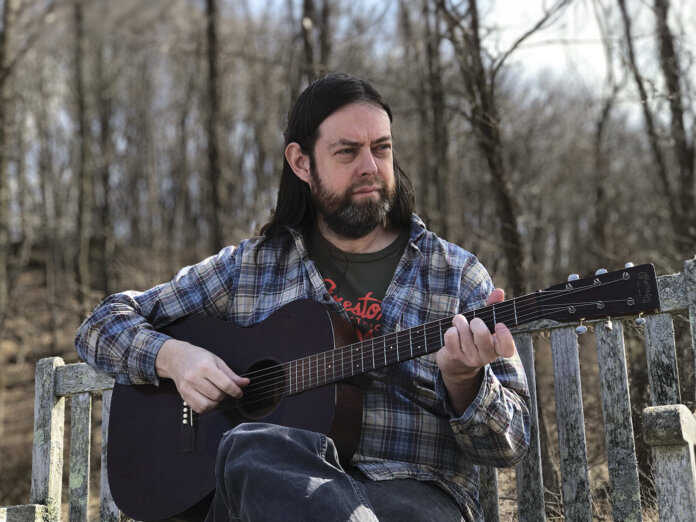A late-’80s Triplett Celtic 34-string harp sits, unyieldingly, at the heart of Murmurs And Whispers, the sixth solo album proper by American singer-songwriter PG Six, aka Pat Gubler. Though he’s played Celtic harp for a good while now, it’s not yet sat quite so comfortably, nor boldly, at the centre of Gubler’s richly allusive folk songs. It’s not all there is to the album – Gubler’s lyrical facility on guitar is here, too, as is his lovely voice – but from the opening strains of “Leaves”, the primacy of the Celtic harp is hard to miss.
- ORDER NOW: The Who are on the cover of the latest UNCUT
Gubler’s history with the Celtic harp goes back to his teens, where he and his brother Steve would both become fascinated with the instrument. “We’d go to concerts by touring artists like Derek Bell (The Chieftains), Kim Robertson, Robin Williamson,” Gubler recalls. His brother bought a Celtic harp in the late ’80s, and Gubler would practise on that instrument, “learning some Irish tunes, ‘Turlough O’Carolan’ and the like, eventually getting one of my own”.
On Murmurs And Whispers, the Celtic harp seems to take on the guise of the album’s guide, in some ways; it’s there, comfortably beckoning the listener into the album on “Leaves”, one of many co-writes on the album, this one with Alan Davidson, the under-heralded genius behind long-running Scottish psych-folk outfit Kitchen Cynics. Its seeming fragility, which is often deceptive – there’s a sturdiness and richness to the melodious ring of the harp’s strings – forms a security net, of sorts, under Gubler’s voice; minimal electronics shade and tint the song.
It’s one of many writing collaborations that dot the nine songs of Murmurs And Whispers. Gubler’s long been a willing collaborator; many listeners will first have encountered his songwriting and remarkable musicianship in the multi-headed hydra that was avant-folk gang Tower Recordings, where he worked alongside other artists like Matt Valentine (of MV & EE), Helen Rush (Metal Mountains), Tim Barnes and Dean Roberts. He’d already recorded a few solo albums by Tower’s dissolution; he’d soon follow through with two thrilling sets for Drag City, Slightly Sorry and Starry Mind.
On those albums, he played with a group featuring, among others, Bob Bannister and Robert Dennis of improv-rock group Tono-Bungay, summoning all the ragged insistence of Richard Thompson-era Fairport Convention, and the mysterious lyricism of Steeleye Span circa Hark The Village Wait. Since that sustained flash of inspiration, he’s released excellent duo albums with the likes of Dan Melchior, and Louise Bock (of Spires That In The Sunset Rise), and worked with Garcia Peoples, Metal Mountains, Weeping Bong Band, Wet Tuna and Stella Kola.
All of which might explain the 12 years that passed since Starry Mind. What it doesn’t quite explain, though, is the insistent paring back that characterises the nine songs assembled here. There’s rarely more than two or three layers of sound playing out across Murmurs & Whispers; a droning hurdy gurdy in “I Have A House”, which gives the song a medieval lilt, Gubler’s vocal melody circling around three insistently sung notes in beautifully paced consort, such that it takes on the power of incantation, before overloaded electric guitar slices through the drones; or the flickering story-song of “Tell Me Death”, co-written with Sharron Kraus, where Gubler’s Celtic harp helps drive the narrative to its inevitable conclusion.
“I Have A House” draws its lyrics from a short story, “Iubhdhán’s Fairy House”, found in Kenneth Hurlstone Jackson’s edited collection of prose and poetry from the eighth to 19th century, A Celtic Miscellany. It’s the song that most clearly signals back to archaic forms, but much of the album shares a tone and mood that feels like a kind of reconstruction, or an inhabiting of much earlier folk styles. It’s there, for example, in the gorgeous, spindly acoustic guitar phrases of “Just Begun”, which call back to the playing of Martin Carthy.
“I Don’t Want To Be Free”, too, signposts these relationships, albeit in a more oblique manner, its tender repetitions for Celtic harp woven tightly around one of Gubler’s most pensive lyrics and deliveries. The trick with Gubler’s writing and performance is that its spontaneous arc belies the deep thinking that goes into its creation; he manages to make these songs and performances sound easy, not off-the-cuff but certainly unforced. And for all his concerns about his singing, Gubler has one of the great modern folk voices, sometimes a ghostly shimmer over the instruments, elsewhere sung-spoken with depth, but no pretension. It’s perfect for songs of such elegant, lyrical boldness.


